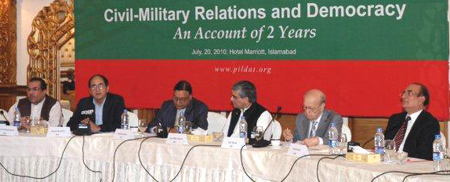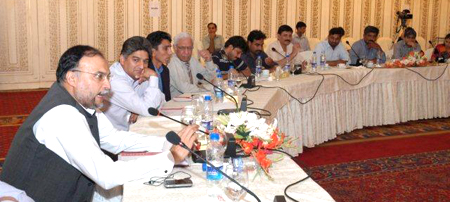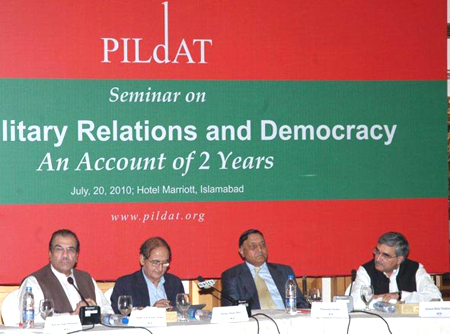|
|
| |
| EVENTS |
|
|
> PILDAT Seminar on Civil-Military Relations and Democracy: An Account of 2 Years
Adherence to Constitution and Rule of Law only guarantees of sustainable Democracy and democratic Civil-Military Relation
|
| |
|
PILDAT Seminar
July 20, 2010
Islamabad
|
|
| |
Islamabad, July 20; Pakistan needs a strong tradition of Constitutionalism, Rule of Law, Good Governance, Participatory Rule and Socio-Economic Equities. Constitution defines all key relationships between institutions of the state, including that of the military under a democratic set-up and adherence to the Constitution and rule of law are the only guarantees of sustainability of democracy and a balanced civil-military relations in Pakistan, believed members of PILDAT Dialogue Group on Civil-Military Relations and other participants at the PILDAT Seminar on Civil-Military Relations and Democracy: An Account of 2 Years. |
|
| |
Leading experts and Members of the PILDAT Dialogue Group on Civil-Military Relations including Dr. Hasan-Askari Rizvi, Lt. Gen. (Retd.) Moinuddin Haider, Mr. Mujib-ur-Rehman Shami, Mr. Shahid Hamid and Lt. Gen. (Retd.) Talat Masood spoke at the Seminar.
|
|
| |
Participants at the Seminar included Members of Parliament such as Mr. Ahsan Iqbal, PML-N MNA, Senator Tahir Mashhahdi from MQM, Senator Surraya Amiruddin from the PPPP, Ms. Tasneem Siddiqui, and Ms. Qudsia Arshad, MNAs from PML-N and Syed Nasir Ali Shah, MNA from the PPPP, etc. as well as analysts and media persons such as Ms. Nasim Zehra, Mr. Ziauddin, Mr. Waheed Hussain, Mr. Khusnood Ali Khan, Mr. Matiullah Jan, Mr. Azaz Syed participated in the seminar amongst others. |
|
| |
Pakistan Military, although back in barracks, remains the most formidable �political� force in Pakistan capable of affecting the course and direction of political and social change, said Dr. Askari while initiating the seminar with his analysis and account of 2 years. Democratic political government has a reasonable space to pursue governance and political management agenda, he argued, though it has not yet managed to create a coherent credible civilian alternative that evokes loyalty at the popular level. The change in landscape in the last two years is that before political leaders, with a desire to knock-out political adversaries, used to approach the military to strengthen their clout but now a section of them is approaching the superior Judiciary hoping it would embarrass the Government or knock-out the President. This, he believed, makes the whole democratic exercise vulnerable to military�s direct and indirect intervention. |
|
| |
Mr. Askari said that the shift in the military�s focus became apparent when it began an image rehabilitation exercise at the societal level. Today, after having gained back much of the lost credibility under sharp political criticism of 2006-2007 under Gen. Musharraf, the military�s key priority is counter-insurgency and terrorism through civilian and societal support. Most political forces, barring the PPP, the ANP and the MQM, are not willing to take political ownership including the PML-N which has an ambiguous position on counter terrorism and insurgency efforts as well as the JI and the PTI. Given the divisiveness in the political class, the military depends on the civilian Government for political ownership. This is what is likely to dominate military�s relationship with the civilian government. |
|
| |
Mr. Askari said that the major irritants in civil-military relationship are lack of civilian and administrative back-up in the areas after military clean-up, rehabilitation of the refugees and their economic reconstruction, propaganda by the Islamist parties and the Political Right against the military, etc. From the military�s perspective the rules of engagement between the civikl and the military today would include no civilian interference in internal organisation and services affairs, shared decision-making in defence and foreign affairs, increased role of the Army High Command in Pak-US Strategic Dialogue, protection of the business and economic interests of the military, etc. It is the management of these issues that will have implications on current and future civil-military relations in Pakistan, he said. |
|
| |
Lt. Gen. (Retd.) Talat Masood believed that a balanced and cooperative civil-military relationship is the cornerstone of democracy which is lacking in Pakistan. There has to be a real supremacy of the civil over the defence sector for a sustainable democracy in Pakistan. The current democratic dispensation, though enjoys entrance-legitimacy, is suffering from performance-legitimacy and it is outsourcing key policymaking to the military to the peril of a true democratic order in Pakistan. |
|
| |
Mr. Shahid Hamid said that for a balanced civil-military relations, the adversarial air between the two has to go. He disagreed that the rule of engagement with the military should mean no civilian criticism for military�s business enterprises and housing colonies as that clearly is not the job of the military. However, a gradual approach, by building the capacity of Parliamentary committees for oversight, a law to govern intelligence agencies, a civilian set-up in the Ministry of Defence are all key steps that need to be initiated and sustained by the Civilian Government and the Civil Society in Pakistan. The Minister of Defence is absent from meetings between the Army Chief and the President or the Prime Minister, strengthening the perception that he is only the Defence Minister for PIA. An empowered Defence Minister in command of the Defence sector is the need of the hour. |
|
| |
Mr. Mujib-ur-Rehman Shami said that it is ironic that military is seen as a messiah today even though the State and Society are only reaping the ill-effects of the earlier military rules in Pakistan. The civilian political governments need institutions in order to deliver and the very institutions have been destroyed by the military during its rule which will take years and patience to build.
Commenting during the Seminar Ms. Nasim Zehra said that failure of governance does not justify military take-over anywhere in the world and trumpeting of bad governance as a reason to intervene in politics is just what the military mindset is accustomed to.
Civilian democratic dispensations can use the lever of good governance and performance to take back the power and regain space lost to military, said Mr. Ahsan Iqbal though he also believed that talk governance failure is just used as a ploy by the military to take over power. �Had Nawaz Sharif not fired me, he would have been Prime Minister today,� said Gen. Musharraf in an interview to the BBC after the October 1999 coup, quoted Mr. Ahsan Iqbal. He believed that the curriculum of the military at the PMA, NDU and the Staff College should include the devastating effects of Martial laws in Pakistan and why democracy, a painstaking and slow process, has a hard time succeeding after military rule in Pakistan.
Members of Parliament, Columnists and Anchors engaged in a heated debate on the illegitimacy of the military rules and why military should not intervene in politics. The democratic dispensation certainly needs to deliver to the people and there is a fear that people may find democracy irrelevant if it does not deliver to the citizens, it was said.
Earlier, Mr. Ahmed Bilal Mehboob, Executive Director PILDAT, said that PILDAT, which initiated and has been running a Dialogue on Civil-Military Relations for the past 5 years in Pakistan, believes that an undemocratic equation between the civil and the military remains the most potent threat to sustainable democracy in Pakistan. The Dialogue on Civil-Military Relations and its public dialogues such as the Seminar, are a way to facilitate a structured dialogue on key issues between the two sides to mitigate conflict. |
|
| |
|
|
| |

|
|
| |
|
|
| |

|
|
| |
|
|
| |

|
|
| |
|
|
| |

|
|
|
|
|
|
|
|
|